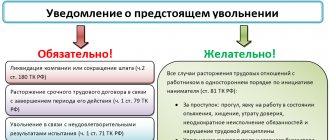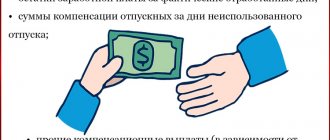Article 33 of the Labor Code upon dismissal for the vast majority of Russians causes a strong association with the dismissal of an employee for drunkenness or absenteeism.
Moreover, such thoughts arise not only among older people, but also among the younger generation, which, due to their age, did not catch the previous laws.
And although labor relations in the last few decades differ significantly from the norms of the Labor Code (LLC) in force in the RSFSR, dismissal of employees for various “sins” remains possible today. Further in the article, the official text of Article 33 of the Labor Code of the Russian Federation about dismissal.
Meaning of Art. 33 Labor Code
In the Labor Code of the Russian Federation (LLC), approved by the Supreme Court of the RSFSR on December 9, 1971 (or the old Labor Code), art. 33 played a fairly important role, because it contained a list of grounds giving the organization’s administration the right to initiate, on its own initiative, the termination of an employment contract with an employee. Most often, dismissal under Article 33 of the Labor Code meant that the employee was fired due to absenteeism or systematic disciplinary violations. This, accordingly, had a negative semantic connotation for him and subsequently served as an obstacle to normal employment.
Although the list of grounds contained in Article 33 of the old Labor Code of the Russian Federation was in fact broader and did not always imply the presence of a violation of discipline. For example, this also included layoffs due to the liquidation of an organization or due to a reduction in the number of employees.
Labor legislation: changes in 2002
On February 1, 2002, the Labor Code was replaced by a new law - the Labor Code of the Russian Federation (LC RF). The need for its adoption was caused by significant changes in both the socio-political life of Russia and economic relations. In the field of labor law, changes were required mainly:
- due to the growing role of market relations in the country;
- the emergence of employers with different forms of ownership than those under which the Labor Code was created.
This is also important to know:
Notice of job reduction: sample, procedure for drawing up the document
The new law was supposed to formulate in a new way the principles of the relationship between employer and employee, transferring their relationship into a contractual one and maximally protecting the interests of each of them.
While maintaining the continuity of many provisions of the old law (about 50%), the new Labor Code of the Russian Federation at the same time became much more detailed, in some places acquired a different content and was divided into chapters and articles in a different way. The number of the latter, in particular, has increased significantly. As a result, their numbering changed, and according to Art. 33 of the Labor Code of the Russian Federation no longer provides for dismissal.
Meanwhile, workers who have not delved into the intricacies of changes in labor legislation retain the memory of dismissal under this article, so you can often hear a reference to it in conversation, implying dismissal for a disciplinary offense. Moreover, some have a note about it in their work book. Taking into account the fact that in reality a different law has long been in force, in which there is an analogue of Art. 33 of the Labor Code under a different number and with significantly changed content, it is more correct to apply a different link to the grounds for dismissal at the initiative of the employer.
Professional lawyer legal defense
The interests of the employer when conducting collective negotiations, concluding or amending a collective agreement, as well as when considering and resolving collective labor disputes between employees and the employer are represented by the head of the organization, the employer - an individual entrepreneur (personally) or persons authorized by them in accordance with this Code, other federal laws and other regulatory legal acts of the Russian Federation, laws and other regulatory legal acts of the constituent entities of the Russian Federation, regulatory legal acts of local government bodies, constituent documents of a legal entity (organization) and local regulatory acts.
Important! A distinctive feature of Article 81 of the Labor Code of the Russian Federation from its predecessor, Article 33 of the Labor Code is that each reason must be confirmed in the form of a “verdict” of a special commission, a medical examination report, a qualification assessment, etc. The Labor Code of the Russian Federation automatically comes to the protection of hired personnel, creating obstacles for the employer to dismiss. All of them are listed in the Labor Code of the Russian Federation
Below is a list of no less popular, and also weighty, reasons that can be used by an employer as a legal reason. The resolution of the Plenum of the Supreme Court of the Russian Federation dated March 17, 2004 No. 2 states that dismissal for such a reason is permissible provided that the employee’s inadequacy for his position or work performed due to his insufficient qualifications is confirmed by certification results. That is, the subjective opinion of management that the employee does not correspond to the position, but simply cannot cope with the job, is not enough
All of them are listed in the Labor Code of the Russian Federation. Below is a list of no less popular, and also weighty, reasons that can be used by an employer as a legal reason. The resolution of the Plenum of the Supreme Court of the Russian Federation dated March 17, 2004 No. 2 states that dismissal for such a reason is permissible provided that the employee’s inadequacy for his position or work performed due to his insufficient qualifications is confirmed by certification results. That is, the subjective opinion of management that the employee does not correspond to the position, or simply cannot cope with the job, is not enough.
Getting fired is not a pleasant topic to discuss. But in order to avoid such a situation, you need to know for what actions the manager has the right to terminate the contract unilaterally. Until recently, the Labor Code of the RSFSR was in force in our country. Under this code, the employer had the right to dismiss an employee under Article 33. In the article we will analyze the reasons for dismissal under this article, and also note changes in Russian legislation.
- Dismissed under Article 33 of the Labor Code of the RSFSR - which means the consequences of application
- Changes in labor legislation upon dismissal of an employee - new Labor Code of the Russian Federation
- Popular reasons for dismissal at the initiative of the employer
- Absenteeism is a reason for unilateral dismissal
- Loss of trust is a new reason for dismissal
- Drunkenness as a reason for dismissal
- Theft as a reason for dismissal
- Inconsistency of the employee with the position (Clause 3. Part 1. Article 81) is a reason for dismissal under the article
The market economy, private property and the construction of capitalism instead of the “confident movement towards communism” are the foundation for revising the legal relationship between the owner and hired personnel. Termination of a concluded individual contract at the initiative of the employer's management, in comparison with the regulations of the Labor Code (LC) has undergone a number of changes in the Labor Code of the Russian Federation (LC RF), protecting the interests of both parties - participants.
At the same time, employees working in educational institutions, but not performing educational functions (heads of organizations, structural divisions, employees of departments serving the educational process, etc.) are not subject to dismissal on the basis under consideration. Let us recall that the qualifications of a worker are determined by documents on his education, as well as relevant forms certifying his work experience and length of service in a specific position. Watch a video about reasons for dismissal Other reasons In addition to the above reasons, there may be a lot of reasons for dismissal.
Analogue of Art. 33 Labor Code in the Labor Code of the Russian Federation
Contents similar to Art. 33 of the Labor Code, in the new law acquired Art. 81 of the Labor Code of the Russian Federation, which reflected a clarified and expanded (in comparison with the Labor Code) list of grounds for dismissal related to the employer’s initiative.
Free legal consultation We will answer your question in 5 minutes!
Ask a Question
Free legal consultation
We will answer your question in 5 minutes!
Ask a Question
Changes in content were reflected not only in a significant increase in the number of reasons for dismissal (13 versus the previous 8), but also in the expansion of the text of explanations for them. At the same time, 2 main provisions present in Art. 33 of the Labor Code, transferred to Art. 81 Labor Code of the Russian Federation:
- In some situations, the employer is required to try to employ the employee before dismissing him;
- Dismissal caused by the initiative of the employer is prohibited while the employee is on sick leave or on vacation.
Changes in legislation
With the transition of our country to market relations and significant changes in the political and social life of the Russian Federation, a new law was adopted - the Labor Code of the Russian Federation.
Having retained the continuity of about half of the provisions of the Labor Code, it regulates labor relations in more detail, taking into account new institutions of ownership, the diversity of legal entities-employers and includes a significantly larger number of chapters and articles.
The numbering and content of sections of the Labor Code of the Russian Federation also does not correspond to the previously effective Labor Code, therefore Art. 33 now regulates the relationship between representatives of the parties to labor relations.
List of reasons for dismissal under Art. 33 Labor Code
Art. 33 of the Labor Code, the dismissal of an employee at the initiative of the employer was associated with:
- with the liquidation of the organization or reduction of its staff (clause 1);
- inadequacy for the position held due to the level of qualifications or health status (clause 2);
- systematic disciplinary violations, expressed in failure to perform labor functions or labor regulations (clause 3);
- absenteeism, which equated to absence from work for more than 3 hours per working day (clause 4);
- an illness lasting more than 4 months in a row, unless it is maternity leave or an injury (illness) resulting from production-related factors (clause 5);
- reinstatement of an employee who previously held the position of the current employee (clause 6);
- showing up at work in a state of intoxication of any kind (clause 7);
- committing theft, the fact of which was confirmed by a decision of the court or other body that brought the employee to punishment (clause 8).
This is also important to know:
Dismissal at will: article of the Labor Code
The clause about the need for an attempt at employment at the same place of work prior to dismissal related to reasons related to:
- with clause 1 - liquidation (staff reduction);
- clause 2 - inconsistency with the position;
- clause 6 - reinstatement of a previously dismissed employee.
Article 33 of the Labor Code of the Russian Federation upon dismissal
Law of the Russian Federation of September 25, 1992 N 3543-1) 4) absenteeism (including absence from work for more than three hours during a working day) without good reason; 5) absence from work for more than four months in a row due to temporary disability, not counting maternity leave, unless the law establishes a longer period for maintaining a job (position) in case of a certain illness. For employees who have lost their ability to work due to a work injury or occupational disease, their place of work (position) is retained until their ability to work is restored or disability is established; (edited)
General points of the old art. 33 Labor Code and new art. 81 Labor Code of the Russian Federation
In the new art. 81 of the Labor Code of the Russian Federation preserves the reasons for dismissal caused by:
- Liquidation (termination of activities) of the employer or reduction of its staff. At the same time, these reasons were divided into 2 independent points.
- Inadequacy for the position due to insufficient qualifications. There was a requirement for confirmation of non-compliance with qualifications by the certification commission. The reason related to health status has been removed from the paragraph.
- Systematic misconduct of a disciplinary nature.
For more information about disciplinary violations, including those committed systematically, read the material “Disciplinary liability of an employee and its types.”
- Absenteeism, which is equivalent to absence from work for more than 4 hours in a row. This paragraph not only increases the length of time of absence, but also details the definition of absenteeism and clarifies the place in relation to which absence from work can be discussed.
- Appearing at work in a state of intoxication of any kind.
- Committing theft, the fact of which is confirmed by a decision of the court or other body that brought the employee to punishment. This reason is supplemented by such grounds as intentional damage to property, expressed in its waste or intentional damage (destruction).
Accordingly, the requirement for the employer to attempt to employ employees before layoffs caused by a reduction in the number or insufficient qualifications of employees remains in force.
Dismissal under article for drunkenness: drawing up an act
One of the most common reasons for the dismissal of an unscrupulous employee by the administration is his appearance at the workplace while intoxicated. In this case, employees may be dismissed if they were intoxicated or in a drugged state during working hours at the place of fulfillment of their labor obligations. This is confirmed in a number of decisions of the Plenum of the Supreme Court.
Innovations Art. 81 of the Labor Code of the Russian Federation in comparison with Art. 33 Labor Code
Not preserved in Art. 81 of the Labor Code of the Russian Federation, the grounds present in Art. 33 of the Labor Code, in the new law were moved to other articles:
- inadequacy for the position due to health conditions was transformed into the basis specified in paragraph 8 of Art. 77 of the Labor Code of the Russian Federation (impossibility of selecting a job that corresponds to the state of health, or the employee’s refusal to do such work);
- a long-term illness can now, depending on the situation, lead to dismissal either under clause 8 of Art. 77 of the Labor Code of the Russian Federation (impossibility of selecting a job that corresponds to the state of health, or the employee’s refusal to do such work), or under clause 5 of Art. 83 Labor Code of the Russian Federation (complete inability to work);
- the reinstatement of an employee who previously worked in the place of the current employee has moved to the list of grounds independent of the will of the parties (Clause 2 of Article 83 of the Labor Code of the Russian Federation).
This is also important to know:
Withdrawal of a resignation letter at your own request: step-by-step instructions, sample order for withdrawal
The new grounds that appeared in Art. 81 Labor Code of the Russian Federation, steel:
- Change of owner of a legal entity (clause 4) as a basis for dismissal of the head of this legal entity, his deputies and the chief accountant.
- A one-time gross disciplinary offense (clause 6), the list of which included absenteeism, showing up at work in a state of intoxication of any kind, and committing theft (embezzlement, deliberate damage or destruction of property). In addition, the following reasons were included here: disclosure of any of the secrets that turned out to be known to the employee;
- violation of labor protection requirements, leading to serious consequences or creating a threat of them.
- a decision made by the owner in relation to the head of the legal entity (clause 2 of Article 278);
Some of these grounds (clauses 7, 8, 10, 13 of Article 81 of the Labor Code of the Russian Federation) were previously present in Art. 254 of the Labor Code and were described as arising under certain conditions.
This is also important to know:
Dismissal with 2 weeks of work: how to count days
Available in Art. 33 of the Labor Code clarifications on an attempt at employment prior to dismissal in some cases, as well as on the prohibition of dismissal during illness and vacation in Art. 81 of the Labor Code of the Russian Federation is supplemented with conditions on the need:
- conducting certification of employees in accordance with labor legislation;
- making every effort to employ an employee before his dismissal, including offers of a lower position and work in another area;
- compliance during the liquidation of a branch with the rules applied during the liquidation of a legal entity;
- non-application of dismissal later than 1 year from the moment of discovery of such offenses as loss of trust in connection with guilty actions in relation to property (clause 7 of article 81 of the Labor Code of the Russian Federation) and an immoral act of a teacher (clause 8 of article 81 of the Labor Code of the Russian Federation), if they committed not at work or not in connection with work functions.
What to do if you are forced to resign
There are situations when an employer tries to force an employee to resign at his own request. There can be many reasons for this: from personal hostility to reluctance to pay compensation amounts in case of layoffs.
As in the case of reluctance to accept a statement, these actions are considered illegal.
Therefore, most likely, if the boss tried to hint at “his own desire”, then there is a high probability that he does not have any legal grounds for dismissal.
When an employee feels pressure from his superiors, and often hears requests to resign at his own request, he has every right to contact the labor inspectorate.
There you need to write a statement about the illegality of the employer’s actions. For the best effect, it is recommended to attach some evidence, for example, audio or video recording.
If an unlawful dismissal has already been made, then you can safely go to court to restore your rights.
What changed
Drawing an analogy between Articles 33 and 81, it is easy to notice the changes that the new code has undergone.
Some items are completely new and have no analogies with the previous version, such as:
- The presence of immoral misconduct among educators and teachers.
- Disclosure of state, commercial or official secrets.
- Change of ownership of the organization.
- The actions of an employee who has direct contact with material assets, which resulted in a loss of trust in him.
- A decision by management that resulted in serious losses for the enterprise.
- Deliberate forgery of documents when applying for a job.
In addition, in many points that have not changed completely, significant additions have been made.
Adoption of the new Labor Code
The adoption of the new Labor Code made it possible to revise a number of legislative norms that were relevant in the Soviet period, but have become obsolete in a market economy. Drawing analogies with the Labor Code, we can say that no more than 50% of that old version remains. The rest of the text has been completely changed, revised and supplemented. The new code has more articles, its functionality is higher and meets modern labor needs of both employers and employees. In addition, constant improvements and amendments are being made to the current Labor Code, which make it possible to react sensitively to the slightest changes in labor standards.
Article 33 of the Labor Code of the Russian Federation has no analogies with the same number in the Labor Code. In the old document, under this figure, the reasons were listed that could become a reason for the dismissal of a working person against his will at the request of the employer. But the new code under this figure contains information of a different kind, relating to completely different areas. In particular, this article talks about who can be an official representative of the employing organization. This is a very important aspect because the company itself does not perform any actions and does not make any decisions. All this is done by people who are directly related to this organization and are vested with certain powers. The head of the company is considered an authorized representative of the employer; he is the one who has the right to make responsible and final decisions. Although this is done in conjunction with other specialists, all final responsibility for this or that decision falls squarely on the shoulders of the manager or his authorized person.
Shift of emphasis in Art. 81 of the Labor Code of the Russian Federation in relation to Art. 33 Labor Code
The reasons for dismissal contained in Art. 33 of the Labor Code, as well as the grounds given in Art. 81 of the Labor Code of the Russian Federation, are divided into 3 groups:
- occurring due to changes in the employer's organizational structure;
- related to the employee’s guilt;
- others.
This is also important to know:
How much compensation is paid for unused vacation upon dismissal?
From Art. 33 of the Labor Code, accordingly, they include:
Free legal consultation
We will answer your question in 5 minutes!
Free legal consultation We will answer your question in 5 minutes!
Call: 8 800 511-39-66
Ask a Question
- liquidation of the employer, reduction of staff;
- disciplinary violations: systematic, absenteeism, intoxication, theft;
- inadequacy for the position held, long-term illness, reinstatement of a previously employed employee.
In Art. 81 of the Labor Code of the Russian Federation these groups include:
- liquidation of the employer, reduction of staff, change of owner;
- systematic and one-time gross violations of labor discipline, loss of trust, immoral act, guilt of the manager, concealment or distortion of information about oneself;
- inconsistency with the position held, additional grounds for the manager, other cases.
Thus, if we do not take into account those grounds that actually do not depend on the will of either the employee or the employer (long-term illness, reinstatement of a previously employed employee), then the grounds for dismissal on the initiative of the employer turned out to be supplemented by a number of reasons of a disciplinary nature (including including those that were previously completely absent from labor legislation) and motives determined by the decisions of the owner (including those that differ depending on the form of ownership).
An error occurred.
Either the manager himself or a person authorized by him has the right to act on behalf of the employer. In state institutions/organizations, the founder, a government agency, can act on behalf of the employer (Part 1 of Article 33).
Representing the interests of a number of employers in negotiations (disputes) with employee associations (a number of collectives) through their territorial or all-Russian associations.
The content of this article does not in any way affect the issues of dismissal of employees. Article 81 Article 81 in the current Labor Code of the Russian Federation is entirely devoted to the termination of labor relations with employees, which is initiated by the administration.
Currently, the law provides for 14 grounds that allow dismissing an employee, even without his consent (against the 8 grounds contained in Article 33 of the Labor Code).
Consequences: as reflected in the work book
In case of dismissal due to a “bad” article, the consequences may be different. Unfortunately, the reason for dismissal from a previous job is indicated in the work book and can complicate the search for another job.
Indicating the reason for the dismissal from the previous job will serve as a “red rag” for the HR department and the other employer. When looking for a job, a number of refusals from employers will follow, since dismissal under Article 81 of the Labor Code of the Russian Federation means that the employee did not conscientiously approach the performance of his professional duties, which is not necessary for any future employer.
Features of termination of an employment contract at the initiative of the employer in the following video:
Why they were fired under Article 33 of the Labor Code
Consequences: as reflected in the work book There are a number of cases when, upon dismissal, Article 33 of the Labor Code is applied (more precisely, this is Article 33 of the previously in force Labor Code, referred to “in the old fashioned way” in case of dismissal at the initiative of the employer).
The corresponding entry appeared on the page of the employee’s work book and implied a negative meaning, subsequently becoming an obstacle to subsequent employment. And although there was practically no lack of work in the Soviet Union, personnel department employees were prejudiced against applicants who were fired “under the article.”








